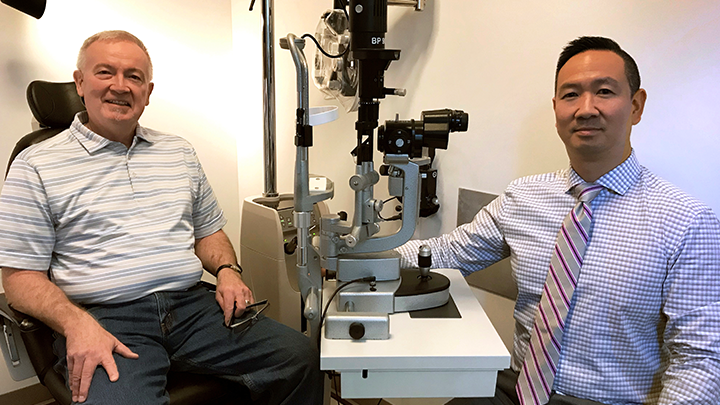
July 12, 2018

Dennis Glass, left, attends a post-operation checkup with Dr. Dean Mah.
Story by Vanessa Gomez
EDMONTON — Sight is a gift that allows us to see the world as it changes before our very eyes. But for some people, like accountant Dennis Glass, degenerative disease leading to blindness is a frightening possibility.
In 2006, Glass went to his optometrist to check out a sudden deterioration in his vision. After years of struggling without a diagnosis, he found himself facing total blindness due to Fuch’s Dystrophy, an eye disease in which the innermost layers of cells in the cornea degenerate.
“I’m a very kinesthetic type of person and the idea of going blind is just petrifying,” says Glass, 68.
The Edmonton man waited two years before receiving a cornea transplant in his right eye, and then another year for his left.
While wait lists have the potential to cause more physical damage, there’s an emotional toll as well.
“It becomes a difficult process to maintain productivity and meet the standards you set for yourself,” says Glass. “You pour so much energy into coping with it that other things that also make up life get put on hold.”
While corneal tissue donations have been on the rise, there’s still a high demand that’s difficult to meet.
“My transplant waitlist is still quite long. There’s still a need for more corneal tissue,” says Dr. Dean Mah, ophthalmologist at the Royal Alexandra Hospital.
Candice Bohonis, a tissue specialist at the Aberhart Centre, says a lack of understanding on the impact of tissue donation has proven one of the barriers to achieving higher numbers of donors.
“One full tissue donor can help up to 65 people. People don’t think the number of people you can help is that high,” says Bohonis. “A donor can help anyone from a baby up to someone who is a senior.”
Just one eye donor can benefit the lives of six people and help them get back to living their lives.
“I pulled my bike out of storage for the first time last year. You can get back into the things you love to do with confidence,” says Glass.
He appreciates the help of donors and healthcare providers — and one day hopes to pay it forward himself.
“One of the first things I did was make sure all my donor cards were signed,” he adds. “It does make a difference.”